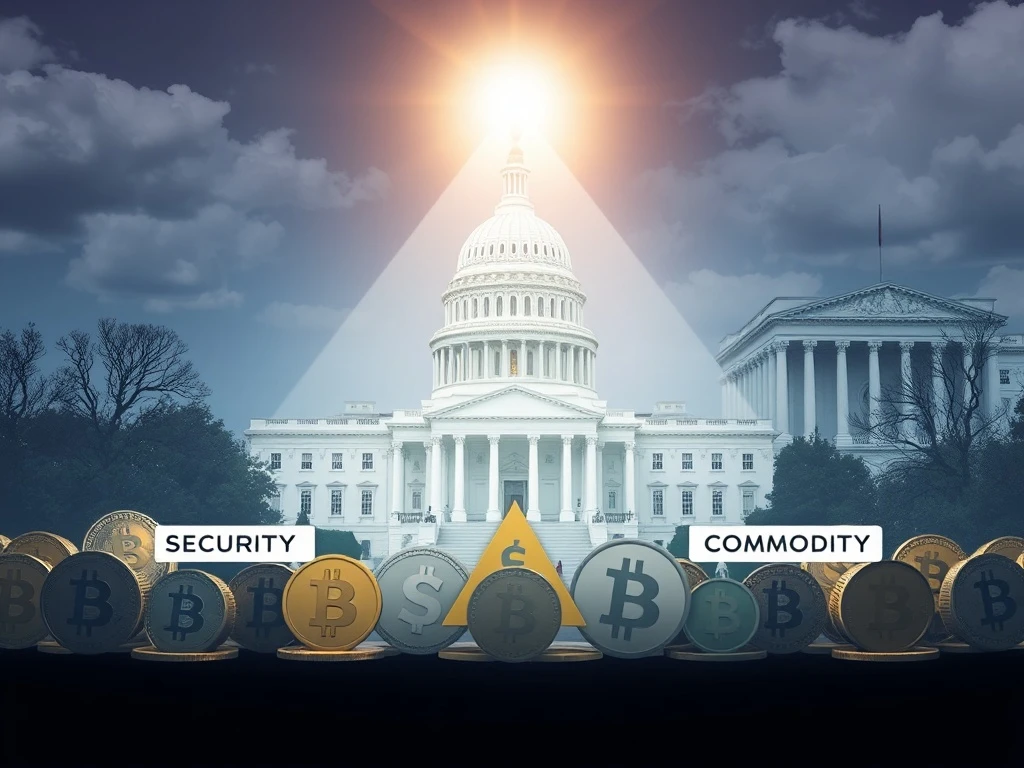Crypto Regulation Unlocks Future for US Crypto Firms: White House Brings Crucial Clarity

For years, the U.S. cryptocurrency landscape has been a maze of uncertainty, with firms grappling for clear guidance. The long-awaited White House crypto policy recommendations are finally here, promising a new era of clarity for US crypto firms and potentially reshaping the future of digital assets. This significant development could be the turning point many have awaited to foster innovation and widespread adoption.
Why White House Crypto Rules Are a Game Changer for US Crypto Firms?
The White House’s comprehensive report on cryptocurrency policy, spearheaded by the Trump administration’s Working Group on Digital Assets, marks a pivotal moment for the industry. Released recently, this report outlines key recommendations across various sectors, including market structure, banking regulations, and strategies to bolster the U.S. dollar’s dominance through stablecoins and revised crypto tax laws. The overarching goal is to end years of regulatory ambiguity that have hindered growth and investment for US crypto firms.
One of the report’s most impactful proposals is the clearer division of responsibilities between the U.S. Securities and Exchange Commission (SEC) and the Commodity Futures Trading Commission (CFTC). This move aims to address longstanding concerns about overlapping or conflicting enforcement actions that have created a challenging environment for businesses operating in the digital asset space.
Achieving SEC-CFTC Clarity: A Path to a Mature Ecosystem?
The report suggests granting the CFTC greater authority over spot crypto markets. This particular aspect of the White House crypto recommendations is seen as foundational. Edwin Mata, a blockchain lawyer and CEO of tokenization platform Brickken, emphasized the importance of this clear distinction.
“Letting each body oversee the instruments that best align with their expertise avoids duplication and confusion,” Mata stated. “This allows for consistent legal interpretations, which is critical in jurisdictions like the United States, where case law and precedent play a dominant role.”
Mata highlighted that past inconsistent regulatory positions led to fragmented legal interpretations, often forcing courts to resolve disputes between agencies. This new framework is expected to “promote coherent jurisprudence and allow legal opinions to be formed on solid ground,” thereby laying the groundwork for a more mature, transparent, and scalable crypto ecosystem. This step is crucial for achieving genuine SEC-CFTC clarity.
The Ripple Lawsuit’s Impact: A Precedent for Crypto Regulation?
The White House’s policy recommendations arrive just over two months after the resolution of one of the most high-profile legal disputes in crypto history: the SEC’s lawsuit against Ripple Labs. The SEC had sued Ripple in December 2020, alleging the firm raised $1.3 billion through unregistered XRP (XRP) securities sales. On March 19, Ripple CEO Brad Garlinghouse announced that the SEC had dropped its appeal against the company, celebrating this as a significant victory for both Ripple and the broader crypto industry.
The legal journey for the Ripple lawsuit involved Judge Analisa Torres ruling in July 2023 that XRP is not a security in retail sales but constitutes one when sold to institutional investors. This nuanced ruling, followed by a $125 million fine in August 2024, provided a crucial precedent for future crypto regulation. The recent joint motion by Ripple and the SEC to release the $125 million held in escrow accounts for settlement costs further underscores the conclusion of this landmark case. This resolution offers a tangible example of how courts may interpret digital assets under existing securities laws, influencing ongoing discussions about SEC-CFTC clarity.
Overcoming Hurdles: What’s Next for US Crypto Adoption?
Analysts from crypto exchange Bitfinex suggest that the White House crypto recommendations may also “ease industry concerns over ambiguous securities laws” by providing clear regulatory boundaries. They see this as addressing a “key hurdle stopping US crypto innovation.” While this advances a broader agenda by urging ‘same risk, same rules’ to close oversight gaps and legitimize crypto through legislation, certain concerns persist.
According to Bitfinex analysts, these concerns include:
- A push for intensified SEC enforcement against non-compliant firms.
- The absence of details on a promised U.S. Bitcoin reserve.
- Potential fractures within the crypto community over regulatory stringency.
Despite these points, the U.S. crypto landscape still requires more recommendations on easing banking custody rules for crypto service providers. There is speculation that work on this critical aspect is ongoing, which would be another significant step for US crypto firms seeking broader mainstream integration. The continuous evolution of crypto regulation remains a priority for the industry and policymakers alike.
A Promising Path Forward for Crypto Regulation
The White House’s latest report marks a significant stride towards establishing a predictable and robust framework for digital assets in the United States. By clarifying the roles of the SEC and CFTC, it aims to foster innovation, reduce regulatory uncertainty, and bolster investor confidence. While challenges remain, particularly concerning banking custody rules and the specifics of enforcement, this foundational step sets a promising course for the future of crypto regulation and the broader digital asset economy in the U.S. This renewed focus on SEC-CFTC clarity, coupled with lessons from the Ripple lawsuit, positions US crypto firms for a more stable and predictable operating environment.









